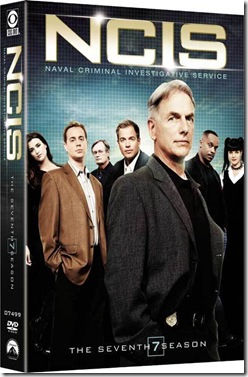Season seven of NCIS was, quite possibly, the show’s best yet. Over the course of the season, characters faced personal challenges that more than rivalled the cases they were working on. Throughout, the writing, performances and direction kept things moving and the audience involved.
Over the course of its seventh season, NCIS was TV’s highest-rated scripted series. Not bad for a series that was spun off from a watchable-but-nothing-special series about Navy lawyers [J.A.G.]. As one of many procedurals currently running, NCIS was the first to take the tack that the investigators could be as interesting as the cases they investigated. The result is a show that has both made its own way and influenced other shows [Numb3rs, for one, followed the character/case balancing act]. It also was one of the few to realize that humor enabled its audience to relate to its characters easily – and that heightened tension in more dramatic moments.
Some of the cases Agent Leroy Jethro Gibbs’ [Mark Harmon] team faced included: the murder of a blogger who had been critical of NCIS; discovering whether team ally and Mossad agent Ziva David [Cote de Pablo] was involved in the death of a marine; tracking down a female assassin who had sparred with Director Vance [Rocky Carroll]; a dead Navy pilot with a jet-pack strapped to his back – Agent Tim McGee’s [Sean Murray] first case as lead investigator [he’s a jet-pack geek], and a cold case Abby Sciutto [Pauley Perrette] uses to teach a class in Mexico that leads to complications for Gibbs.
It’s the personal lives of the characters, though, that held my attention. Watching McGee’s enthusiasm as he investigates that jet-pack-related murder [Ignition] reminds us that he’s not just the team’s computer ace. We learn a great deal about why Agent Tony DiNozzo [Michael Weatherly] is the way he is when we meet his dad, Anthony DiNozzo Senior [Robert Wagner]. If we didn’t know enough about Ziva, her decision to apply for U.S. citizenship [in order to become a full-fledged NCIS agent] added yet another layer to her character.
There several poignant moments, too – like the biggest and saddest event in NCIS ME Donald “Ducky” Mallard’s [David McCallum] life; the manner in which Gibbs ties into Abby’s Mexican cold case, and Gibbs’ Christmas visit from his father [Ralph Waite]. The humor is also pretty solid. One of the best instances is a barroom brawl which involves Tony and Ziva, but there are more instances than can be mentioned in even an exhaustive review.
Both in terms of character development and intriguing cases, season seven of NCIS is probably the most consistently excellent season of the series. There are very few moments that feel forced; very few episodes that don’t work well. NCIS remains one of the very few series that I must watch in real time after so many years. I think that says a lot about the show.
Features: Two Audio Commentaries [Mark Harmon, director Arvin Brown and writer Gary Glasberg] for Faith; Michael Weatherly and Robert Wagner for Flesh and Blood]; Featurettes: The Future is Now: NCIS Meets The Jet-Pack; Gimme Two Steps: Staging The Bar Fight; Celebrating Episode 150; Cast Roundtable; Lucky Number Seven; Personal Effects; NCIS: A Sound Investment, and Home Sweet Home: Creating The Gibbs House.
Grade: NCIS: The Seventh Season – A
Grade: Features – A-
Final Grade: A
